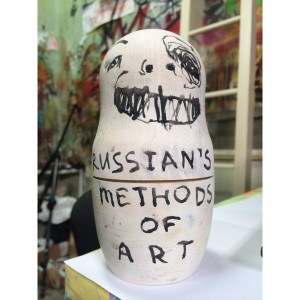We call it Intermedia. Dick Higgins coined the term and gave me license to do all these different
things. Which he, by the way, was not interested in doing. He did not want to publish books so, there
wasn’t any difficulty there. He didn’t go on tour or he didn’t enjoy, you know, performing before
people. Once I began, I began to do performance art it was interesting that I just immediately
dropped painting because I realized that most of my painting had been aimed at sort of a career as a
painter and when I realized that it wasn’t going to happen nor did I perhaps want it to happen
because George and Dick and the Fluxus group, I had a certain authority in my work and in my
person that was very fulfilling, very sustaining as an artist and allowed me to be adventurous. Do
things like putting beans into paper, or making these sound instruments.
This is a work with three artists. This is Bob Watts at the top, this is the Balinese wedding, this is
George Brecht, who always worked with words… BLINK, and my scissors. Again I find a sort of
domestic touch to most of what I was doing in those years. There were solo pieces and group
pieces. one of the pieces that I enjoyed most to do was called „Song of your choice“ and that was
five or six performers lined up on stage and than with a conductors baton, you all break into a song,
whatever song you want to sing, and this was very amusing and a very interesting piece because you
always would have a few people who would belt it out, and then you would have a gentler voice.
But you sang it to the end of the song. It’s not like I ended it. So would have someone still finishing
up their song and this end of the line. „Song of your choice“ I didn’t many times, and the solo piece I
did often was „shoes of your choice,“ which could nicely follow a piece like „song of your choice“
where, with a microphone, the performer or beckoning someone from the audience who would like
to speak about their shoes, could come up to the microphone and describe everything they could
about the shoes they are wearing.
„Make a salad.“ Yes, I think it was first done in London. I’m not sure…But it was absolutely stunningly
different from anything that had gone on the stage. To have food prepared live on the stage, and I
would mic the sounds of the chopping at each of the tables. It was London were we threw the
choppings into a huge tarp which was held at each end and the dressing was pored into the tarp
and it was rustled around and then the audience lined up and I served it with thongs out of the tarp.
It almost seems kind of matter of fact now, but something like that in a theatre was…We had to go
through all kinds of shenanigans. To get the chef, to get food on the stage, to get napkins. I mean all
that, feeding people in the theatre. You just don’t do that. So, to bring food into the idea of
performing with people is something that I’m happy that I could help with. I also have a piece „Make
a soup.“And I’ve done this several times in this country in a huge pickle barrel, or a can of…Having a
basic broth and then having vegetables chopped and put into the broth which is being heated. And
then people would have to wait while the carrots were cooked and I could talk about different
things. I mean, I think the important thing about a piece like „Child art piece“ or „Make a salad“ is that
it always performed. Women perform „Make a salad“ all the time in their homes. So I’m sort of
elevating that action to having everybody consider. Not just melt it down, but what is in this salad?
What is this dressing? What kind of lettuce did this person chose to use for me? So I think, „Make a
soup“ and „Make a salad“, I’m very happy to have brought those into the Fluxus tradition early. It’s
kind of signature piece of mine and it doesn’t have to be a huge salad. I’ve prepared a salad just for
the performers, for instance, rather than the audience. I’m sure I’ve done it a dozen times at least.

















